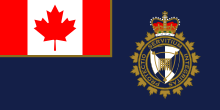Canada Customs
|
Canada Border Services Agency Agence des services frontaliers du Canada |
|
|---|---|
| Common name | Border Services |
| Abbreviation | CBSA-ASFC |

Heraldic Badge of the Canada Border Services Agency
|
|

CBSA coat of arms
|
|

Flag and Ensign of the Canada Border Services Agency
|
|
| Motto |
Protectio Servitium Integritas Protection, Service, Integrity |
| Agency overview | |
| Formed | December 12, 2003 |
| Preceding agencies |
|
| Employees | 14,113 |
| Legal personality | Governmental: Government agency |
| Jurisdictional structure | |
| Federal agency | Canada |
| Governing body | Public Safety Canada |
| Constituting instruments | |
| General nature |
|
| Operational structure | |
| Elected officer responsible | Ralph Goodale, Minister of Public Safety |
| Agency executive | John Ossowski, President |
| Regions |
8
|
| Website | |
| CBSA Homepage | |
The Canada Border Services Agency (CBSA) (French: Agence des services frontaliers du Canada—ASFC) is a federal agency that is responsible for border enforcement, immigration enforcement and customs services.
The Agency was created on December 12, 2003 (the same day Paul Martin became Prime Minister of Canada), by an order-in-council amalgamating Canada Customs (from the now-defunct Canada Customs and Revenue Agency) with border and enforcement personnel from the Department of Citizenship and Immigration Canada (CIC) and the Canadian Food Inspection Agency (CFIA). The Agency's creation was formalized by the Canada Border Services Agency Act, which received Royal Assent on November 3, 2005.
Since the September 11 attacks against the United States, Canada's border operations have placed an enhanced emphasis on national security and public safety. The Canada–United States Smart Border Declaration, created by John Manley and Tom Ridge, then first U.S. Secretary of Homeland Security of the Department of Homeland Security, has provided objectives for co-operation between Canadian and American border operations.
The CBSA oversees approximately 1,200 service locations across Canada, and 39 in other countries. It employs over 12,000 public servants, and offers around-the-clock service at 119 land border crossings and thirteen international airports.
...
Wikipedia
